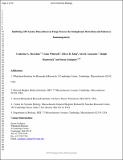Inhibiting GPI Anchor Biosynthesis in Fungi Stresses the Endoplasmic Reticulum and Enhances Immunogenicity
Author(s)
McLellan, Catherine A.; Whitesell, Luke; King, Oliver D.; Lancaster, Alex K.; Mazitschek, Ralph; Lindquist, Susan; ... Show more Show less
DownloadMcLellan, C.A., et al. -Inhibiting Gpi Anchor Biosynthesis in Fungi Stresses the Endoplasmic Reticulum and Enhances Immunogenicity.- Acs Chem Biol 7(2012)1520-28..pdf (10.48Mb)
PUBLISHER_POLICY
Publisher Policy
Article is made available in accordance with the publisher's policy and may be subject to US copyright law. Please refer to the publisher's site for terms of use.
Terms of use
Metadata
Show full item recordAbstract
In fungi, the anchoring of proteins to the plasma membrane via their covalent attachment to glycosylphosphatidylinositol (GPI) is essential and thus provides a valuable point of attack for the development of antifungal therapeutics. Unfortunately, studying the underlying biology of GPI-anchor synthesis is difficult, especially in medically relevant fungal pathogens because they are not genetically tractable. Compounding difficulties, many of the genes in this pathway are essential in Saccharomyces cerevisiae. Here, we report the discovery of a new small molecule christened gepinacin (for GPI acylation inhibitor) which selectively inhibits Gwt1, a critical acyltransferase required for the biosynthesis of fungal GPI anchors. After delineating the target specificity of gepinacin using genetic and biochemical techniques, we used it to probe key, therapeutically relevant consequences of disrupting GPI anchor metabolism in fungi. We found that, unlike all three major classes of antifungals in current use, the direct antimicrobial activity of this compound results predominantly from its ability to induce overwhelming stress to the endoplasmic reticulum. Gepinacin did not affect the viability of mammalian cells nor did it inhibit their orthologous acyltransferase. This enabled its use in co-culture experiments to examine Gwt1’s effects on host–pathogen interactions. In isolates of Candida albicans, the most common fungal pathogen in humans, exposure to gepinacin at sublethal concentrations impaired filamentation and unmasked cell wall β-glucan to stimulate a pro-inflammatory cytokine response in macrophages. Gwt1 is a promising antifungal drug target, and gepanacin is a useful probe for studying how disrupting GPI-anchor synthesis impairs viability and alters host–pathogen interactions in genetically intractable fungi.
Date issued
2012-06Department
Massachusetts Institute of Technology. Department of Biology; Whitehead Institute for Biomedical ResearchJournal
ACS Chemical Biology
Publisher
American Chemical Society (ACS)
Citation
McLellan, Catherine A., Luke Whitesell, Oliver D. King, Alex K. Lancaster, Ralph Mazitschek, and Susan Lindquist. “Inhibiting GPI Anchor Biosynthesis in Fungi Stresses the Endoplasmic Reticulum and Enhances Immunogenicity.” ACS Chemical Biology 7, no. 9 (September 21, 2012): 1520–1528.
Version: Author's final manuscript
ISSN
1554-8929
1554-8937